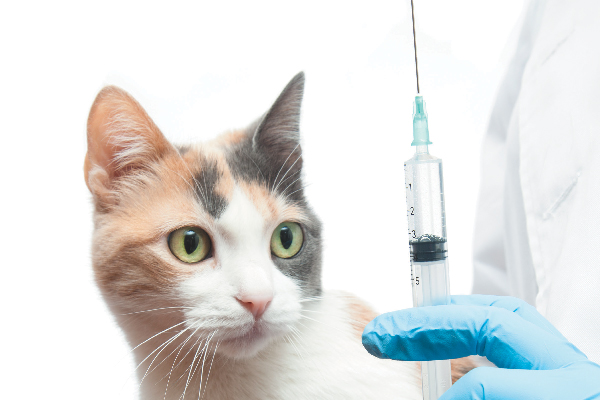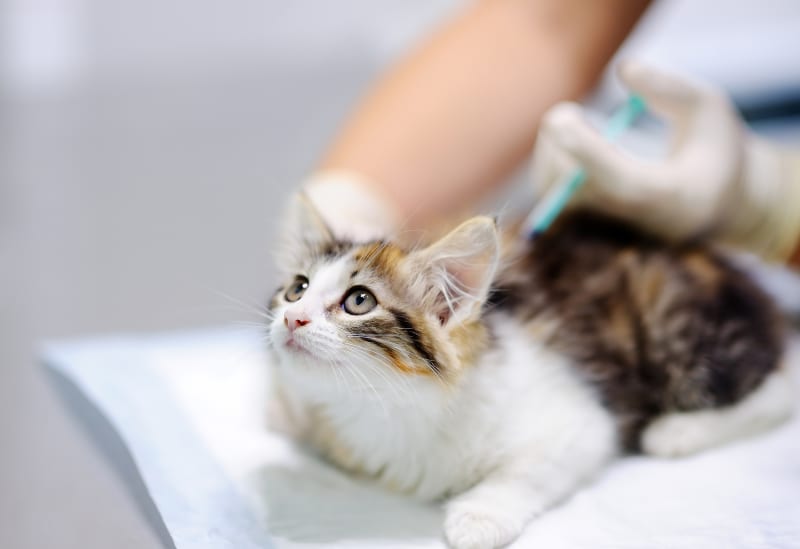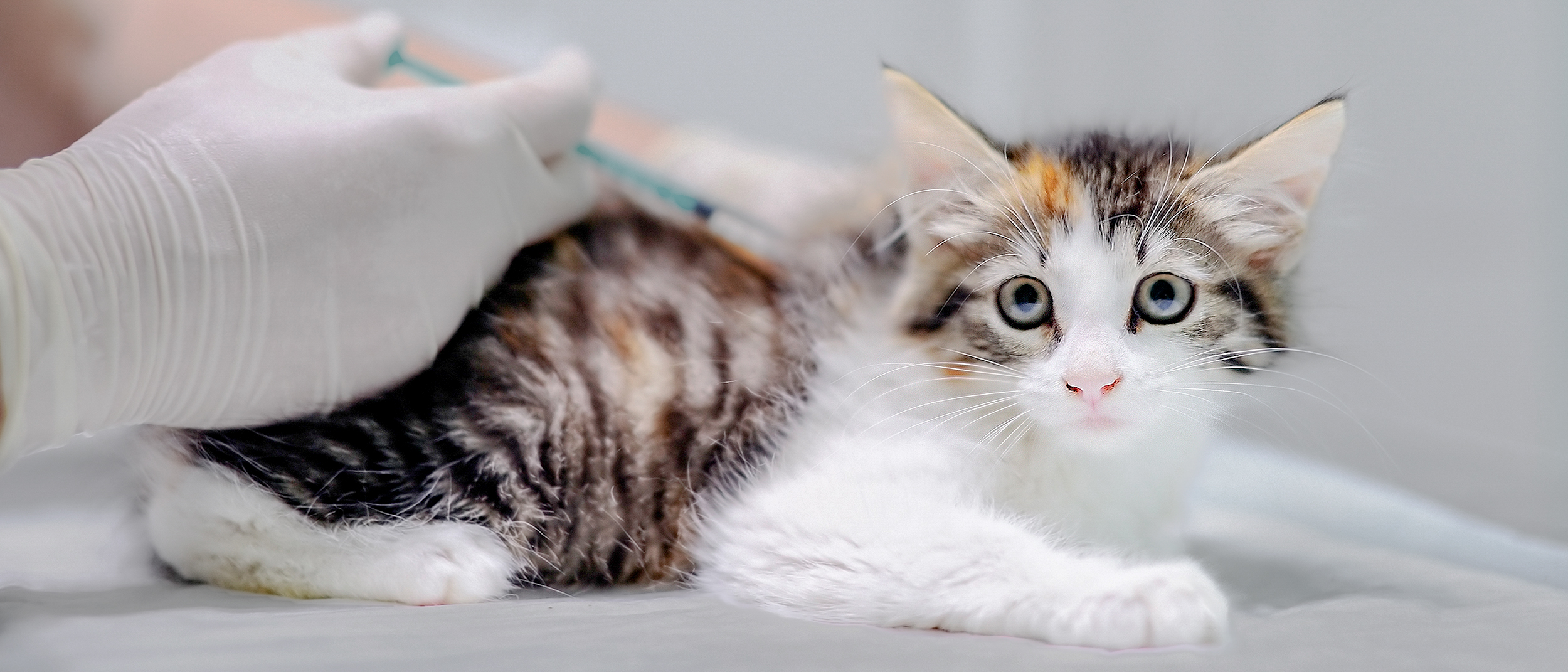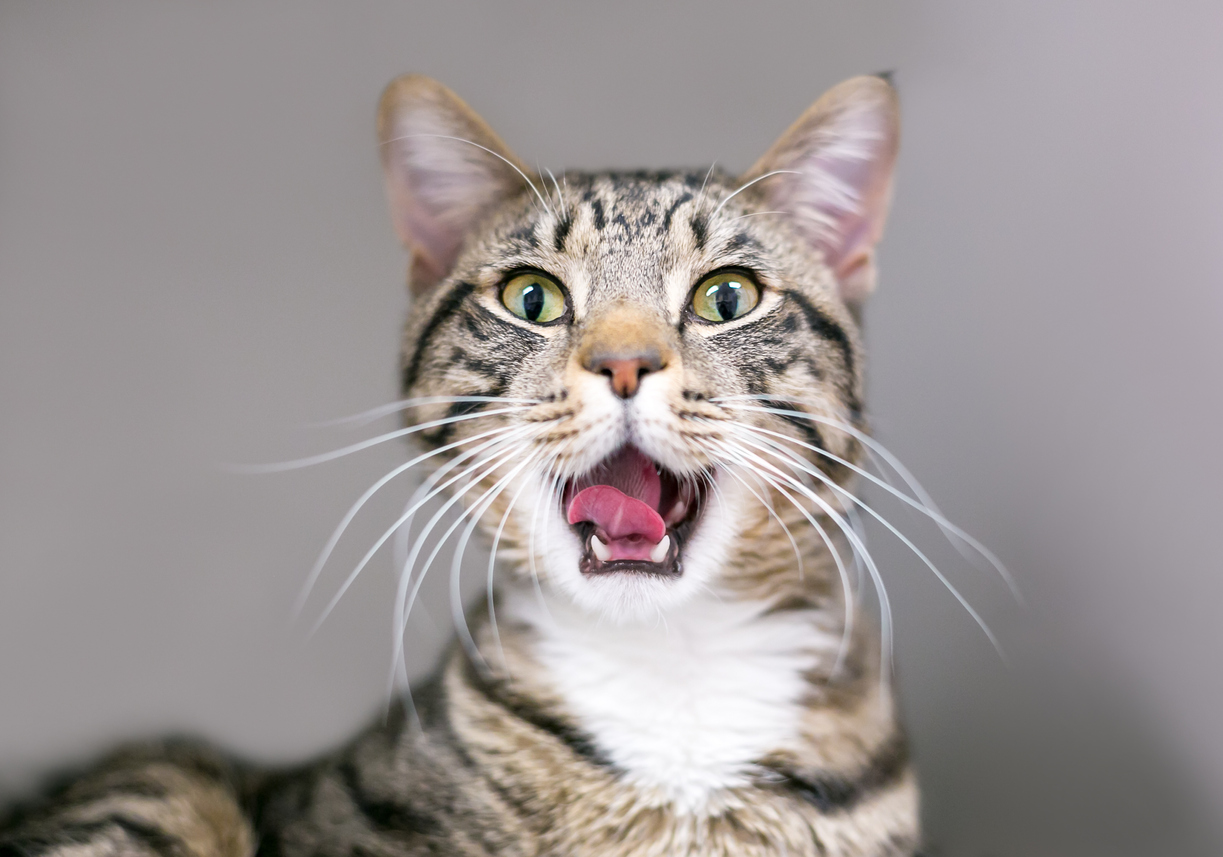Vaccines for Cats
Recent advances in veterinary medical science have resulted in an increase in vaccines available for cats. Improvements are continuously being made in vaccine safety and effectiveness. Veterinarians routinely recommend certain vaccines for all cats (called core vaccines), while others (called non-core vaccines) are used more selectively according to the cat’s environment and lifestyle.
In all cases, decisions regarding the vaccine types and vaccine schedules that are best for each cat require professional advice.
Which vaccines are recommended for cats?
At this time, core vaccines, as recommended by the American Association of Feline Practitioners (AAFP) for kittens and adult cats include the following:
- Feline panleukopenia virus
- Feline viral rhinotracheitis, also known as herpes virus type 1 (FHV-1)
- Feline caliciviruses
- Rabies virus
- Feline leukemia virus (FeLV) is considered a core vaccine in kittens only.
Non-core (discretionary, or optional vaccines), as recommended by the AAFP for cats with a risk of exposure to specific diseases:
- Chlamydophila felis (causes feline chlamydiosis)
- Bordetella bronchiseptica (causes feline bordetellosis) 3. Feline leukemia virus (FeLV) in adult cats

How do vaccines work?
Vaccines work by stimulating the body's immune system to recognize and fight a particular microorganism such as a virus, bacteria, or other infectious organisms. Once vaccinated, the animal's immune system is then primed or prepared to react to future infection with that microorganism. In other words, the vaccine mimics a true infection so that the immune system can better protect the body in the future. Depending on the disease, the vaccine will help the body prevent infection or lessen the severity of the infection and promote rapid recovery.
While a vaccine can prevent illness, it cannot block microorganisms from getting into the body. This means that sometimes a cat may not look sick thanks to the vaccine, but the cat can still spread the invading microorganisms to other cats. This is not a major consideration in the pet cat but may be important in the breeding colony.
What is the difference between the various types of vaccines?
There are three major types of vaccines:
- Modified live vaccines. These vaccines contain live organisms that are weakened or genetically modified so that they will not produce disease but will multiply in the cat's body. Live vaccines induce a stronger, longer-lasting immunity than inactivated vaccines. It is not advisable to use modified live vaccines in pregnant queens or cats whose immune system is not working properly such as cats infected by feline immunodeficiency virus (FIV), or other diseases.
- Killed (inactivated) vaccines. These vaccines are prepared using actual organisms or genetically modified organisms that have been killed by various treatments. On their own, they do not give as high a level of protection as the live replicating type of vaccine, so killed vaccines may have an adjuvant (added ingredient) to make the immune response stronger.
- Subunit vaccines. These are more commonly called recombinant-DNA vaccines. They are vaccines in which the infectious organism has been broken apart and only certain parts are included in the vaccine.
Many vaccines come as combinations so that protection against more than one disease is achieved in a single injection or administration. Some vaccines are intranasal (or given by drops into the nose), but the majority are given by injection. Your veterinarian will advise you on the most appropriate vaccines for your cat.

When should my kitten be vaccinated?
Generally, kittens are vaccinated for the first time between six and eight weeks of age, and booster doses are given every three to four weeks until 16-20 weeks of age. A kitten will not be fully protected until seven to ten days after completing the vaccination series. Under certain circumstances, your veterinarian may advise an alternative regime (see handout “Recommendations for New Kitten Owners” for further information on vaccines in kittens).
How often should booster vaccinations be given?
In the past, veterinarians recommended booster vaccinations for cats on a yearly basis. However, as we learn more about, and improve vaccines, recommendations regarding booster frequency continue to evolve. The appropriate interval for boosters will vary with individual lifestyles. Most adult cats that received the full booster series of vaccines as kittens should be re-vaccinated a year later and then every one to three years based on a lifestyle risk assessment. If your cat is at higher risk for exposure to a disease, a more frequent vaccination schedule (every year) may be recommended. It is important to discuss your cat's lifestyle with your veterinarian to determine the appropriate vaccinations and vaccination schedule for your cat.
The AAFP vaccination guidelines recommend that low-risk adult cats be vaccinated every three years with the core vaccines, and then as determined by your veterinarian for any non-core vaccines. Some vaccine manufacturers have developed approved three-year doses for many of the core vaccines. Your veterinarian is the ultimate authority on how your cat should be vaccinated.

Will vaccination always protect my cat?
Vaccination will protect the vast majority of cats but under some circumstances, vaccine breakdowns will occur. Reasons for such breakdowns or apparent vaccine failure include:
Variations between different strains of viruses. This is particularly a problem for example with feline calicivirus infections, where, like the common cold in people, there are a large number of different strains. Available vaccines may only partially protect against some of these strains.
Maternally derived antibodies. Kittens acquire maternal antibodies from the mother (through the uterus before birth and from the milk during nursing). A well-vaccinated queen passes antibodies to her kitten, and these antibodies protect the vulnerable kitten against those diseases for the first two to three months of life. However, during this same period, those antibodies from the mother can block the effects of vaccination in the kitten, the same way they can block actual infection. This blocking effect decreases over time as the maternal antibodies gradually disappear and occurs between two to four months of age. Because this time range varies between kittens, booster vaccines are recommended frequently until the kitten is older.
The cat was stressed or not completely healthy at the time of vaccination. Stress can prevent a good response to vaccination. For this reason, it is better to let a kitten settle into its new home for five to seven days before a vaccination is given. Before administering a vaccine, your veterinarian will perform a complete physical examination to help ensure that there are no signs of clinical disease.
Some vaccine types are not always able to completely prevent infection. Some vaccines are designed to lessen the severity of the disease. Therefore, it may look like the vaccine did not work, when it actually did prevent severe disease.
The immune system of the cat is under-performing or incompetent. This can occur due to some other disease, or complications associated with advanced age.
These are not the only reasons for vaccination failure, but they are the most common. If you feel your cat has contracted an infection for which it has been vaccinated, let your veterinarian know so tests can be done to investigate why vaccination has failed to be protective.
What are the risks of vaccination?
There are very few risks associated with vaccination. Your veterinarian can advise you on specific details concerning your cat. You may notice your cat has a temporary loss of appetite or is less lively a day or two after a vaccination, but this should resolve within 24-48 hours. Very few cats may be allergic to one or more components of the vaccine and have more serious side effects such as difficulty in breathing, vomiting, or diarrhea. If these signs occur, contact your veterinarian immediately.
A rare form of soft tissue sarcoma known as vaccine-associated or injection-site fibrosarcoma has been associated with a reaction to vaccine components or injectable medication in a very small number of genetically susceptible cats. The benefits of vaccination greatly outweigh these small risks in most situations.
What are the diseases my cat can be protected from through vaccination?
Feline panleukopenia infection (FPV). This is an uncommon disease today because of widespread vaccination but the risk remains high. When the disease occurs, severe and often fatal gastroenteritis (stomach and intestinal infection), with profound depression, dehydration, and collapse. It is very contagious to other cats. Vaccination provides a high level of long-lasting protection.
Feline upper respiratory virus infection. The disease is caused by the FVR virus (FHV-1) or the caliciviruses (FCV), sometimes simultaneously. The syndrome is commonly termed feline upper respiratory infection (URI) or sometimes, erroneously, the cat flu. While not usually very serious, except in young kittens, it is a very common infection in unvaccinated cats and can cause long-term problems. Vaccination is only moderately effective, as solid immunity to these viruses is not long-term and may be overcome by a high dose of virus in the immediate environment. Vaccination significantly reduces the severity and duration of infection.
Feline chlamydiosis or chlamydial conjunctivitis. This tends to be a particular problem in colony cats or in certain geographical locations. Chlamydiosis is a bacterial infection due to the organism Chlamydophila felis, which causes painful inflammation and swelling of the conjunctiva or the membranes around the eye as well as upper respiratory infections. It has also been associated with infertility in queens. Infection in colonies of cats can last for long periods because protection against reinfection (immunity) is relatively short-lived. Vaccination can help to prevent infection from becoming established in a colony and can be used in conjunction with treatment where the infection is already present.
Feline leukemia virus (FeLV) infection. This virus is widespread and infection in outdoor cats or in catteries is common. Kittens are also highly susceptible to infection, making FeLV a core vaccine for kittens. Many persistently infected cats will die either from tumors or from immune system damage caused by the viral infection. Current vaccines provide a good level of protection and do not interfere with routine testing for the virus in breeding colonies. Because the virus tends to take many months before it causes disease, infected cats can appear completely normal and healthy. For this reason, your veterinarian will perform a blood test on your cat to make sure she is not infected before vaccination. Despite vaccination, a few cats will still become infected with the virus.
Rabies. This disease is important to consider because it almost always causes death once symptoms occur and because a bite from an infected animal can spread the infection to humans and other animals. Rabies causes neurological abnormalities that quickly lead to death. Rabies vaccination is an essential part of the vaccination program for all cats and is usually required by law in most counties.
Bordetella. This is another upper respiratory infection in cats. This vaccine is generally only used as a method of controlling infection in a multi-cat household or cattery where the infection has been confirmed.



